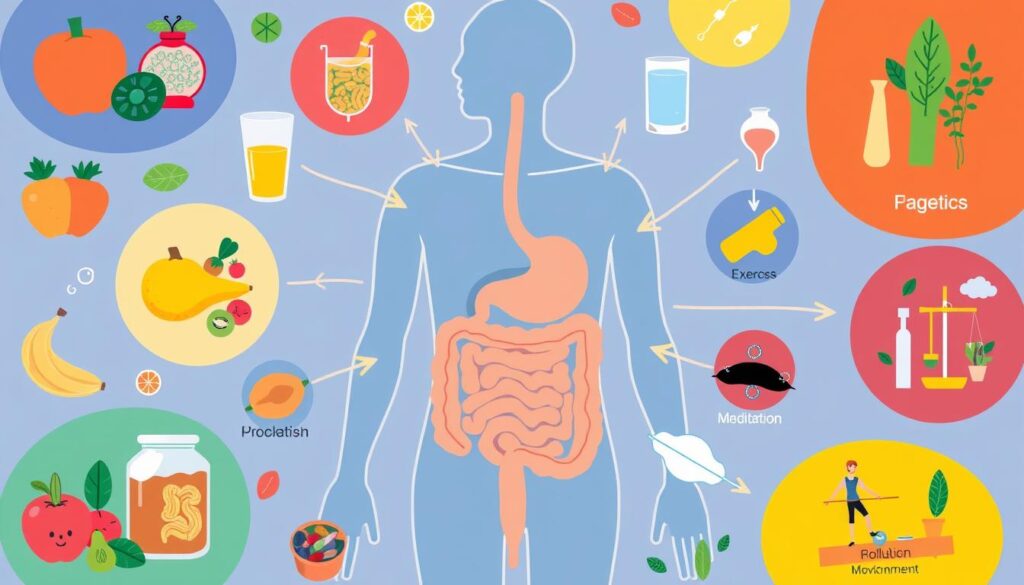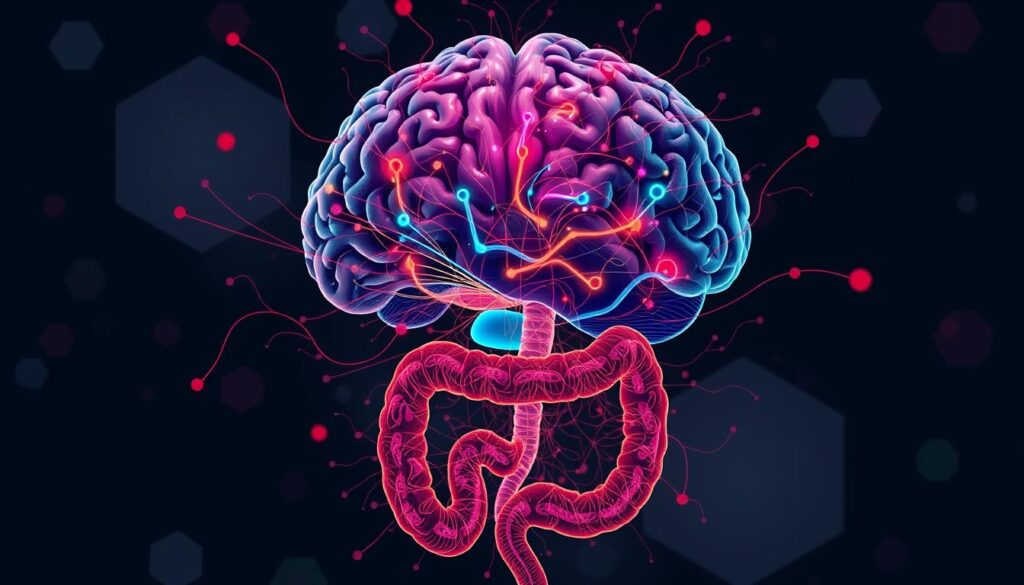Did you know your gut’s health is key to your overall wellbeing? The gut microbiome a complex mix of microorganisms in your digestive tract is vital for many bodily functions.
But what makes a gut healthy and why is it so important for our health?
Key Takeaways
- A balanced gut microbiome is essential for proper immune system function, hormone regulation, and overall bodily processes.
- An imbalance of good and bad bacteria in the gut can lead to chronic fatigue, inflammation, and even autoimmune disorders.
- Gut health plays a crucial role in digestion, nutrient absorption, and waste elimination.
- Factors like stress, diet, and medication can significantly impact the health of the gut microbiome.
- Improving gut health through diet, lifestyle changes, and the use of probiotics and prebiotics can have far-reaching benefits for overall wellbeing.
What is Gut Health?
Gut health is key to our overall well-being. It depends on the balance of good and bad bacteria in our digestive system. The gut microbiome, a vast community of microorganisms, is essential for our body’s functions. It helps regulate our immune system and produces hormones and neurotransmitters.
Understanding the Gut Microbiome
The gut microbiome is a unique ecosystem in each person. It’s shaped by diet, lifestyle, and genetics. When this balance is off, it can cause health issues like digestive problems, inflammation, and mental health concerns.
The Balance of Good and Bad Bacteria
Keeping a healthy gut means having the right mix of good and bad bacteria. Good bacteria, like Lactobacillus and Bifidobacterium, aid in digestion and nutrient absorption. They also boost our immune system. But, too much bad bacteria, caused by stress, poor diet, and antibiotics, can harm our gut and health.
Gut health may influence and improve conditions such as rheumatoid arthritis and other autoimmune illnesses, cancer, heart disease, and diabetes.
Recent studies show that a healthy gut balance is crucial for our health. It can help with autoimmune diseases, cancer, heart disease, and diabetes.
Why is it important to have a healthy gut?
Keeping our gut healthy is key for our overall health. The gut, called the second brain is vital for digestion, immune system, and hormone production.
The gut microbiome has over 100 trillion microorganisms, mostly bacteria. This diverse group affects digestion, immune system function, and hormone levels. It’s the base of good health.
An unhealthy gut, or gut dysbiosis can cause many problems. These include chronic fatigue, inflammation, and autoimmune disorders. The gut has trouble digesting food, removing toxins, and controlling body systems.
| Importance of Gut Health | Potential Consequences of Gut Dysbiosis |
|---|---|
|
|
Keeping our gut healthy through diet, exercise, and managing stress is crucial. It greatly impacts our overall health and well being. By focusing on gut health we support better digestion a strong immune system and hormone balance. This leads to a healthier more vibrant life.

The Gut’s Role in Overall Health
The gut is more than just a digestive system. It plays a key role in our health and well-being. It houses about 80% of our immune system, making it crucial for our immune function. A healthy gut microbiome is vital for regulating our immune system and protecting us from harmful pathogens.
The gut also influences hormone and neurotransmitter production. Up to 90% of serotonin, the feel-good chemical, is made in the gut. This shows the strong connection between the gut and our mood, sleep, and other bodily processes.
Immune System Regulation
The gut microbiome helps train and regulate our immune system. Different gut bacteria work with immune cells to tell them what’s harmless and what’s not. This helps our immune system respond correctly, neither too much nor too little. An imbalance in the gut microbiome, or dysbiosis, can disrupt this balance and affect our immune function.
Hormone and Neurotransmitter Production
The gut is responsible for making a lot of our hormones and neurotransmitters. These include serotonin, dopamine, and GABA. They are important for mood, sleep, appetite, and other bodily functions. When our gut health is off it can affect the production and balance of these chemicals, leading to various health issues.
A healthy gut is the foundation for overall health and well-being. By supporting the gut, we can optimize immune function, hormone balance, and the gut-brain connection.
Factors Affecting Gut Health
Keeping your gut healthy is key for feeling good. Many things can affect your gut health. Knowing what these are helps keep your gut working well.
Stress and Its Impact
Too much stress can hurt your gut. It makes your gut more open and can upset the balance of good and bad bacteria. Research shows stress can mess with your gut’s balance, causing inflammation and stomach problems.
Diet and Nutrition
What you eat shapes your gut’s bacteria. Eating lots of processed foods and sugar can harm your gut. But, eating more fruits, veggies, and whole grains helps your gut stay healthy.
Antibiotics and Medications
Antibiotics are sometimes needed but can harm your gut over time. They kill both good and bad bacteria, upsetting the balance. Some medicines, like antacids, can also mess with your gut.
Knowing what affects your gut health is the first step to a healthy gut. By managing stress, eating right, and being careful with medicines, you can help your gut stay healthy. This supports your overall health and well-being.

Signs of an Unhealthy Gut
Keeping your gut healthy is key for feeling good overall. But, many face challenges with signs of an unhealthy gut. Common symptoms include digestive problems like gas bloating, constipation, and diarrhea.
But, an unhealthy gut’s effects don’t stop at the stomach. Autoimmune disorders such as thyroid issues rheumatoid arthritis and type 1 diabetes, can point to poor gut health. Also, brain fog headaches poor focus fatigue chronic pain and sleep issues might be linked to gut imbalance.
Other symptoms include unexplained weight changes, mood swings like depression and anxiety, and skin problems like acne eczema, and psoriasis. These symptoms show how vital it is to tackle gut health issues.
Stress, diet, and antibiotics can upset the gut’s balance of good and bad bacteria. Recognizing these signs can help you take steps to better your gut health and overall well-being.
It’s crucial to keep your gut healthy for optimal health. If you notice any of these signs, seeing a healthcare professional is a good first step. They can help find the cause and guide you to improve your gut health.
Strategies for Improving Gut Health
Keeping your gut healthy is key for feeling good overall. It helps with fighting off sickness, absorbing nutrients, and even affects your mood. Luckily, there are many ways to boost your gut health.
Dietary Changes
Eating the right foods is a big step towards a healthier gut. A gut-healthy diet should include lots of fiber from whole foods. Fruits, veggies, whole grains, and legumes are great for feeding the good bacteria in your gut.
Probiotics and Prebiotics
Adding probiotics and prebiotics to your meals can also help. Probiotics are live bacteria and yeasts that add to the good guys in your gut. Prebiotics, like dietary fibers, feed these probiotics. Yogurt, kefir, and sauerkraut are full of probiotics. Bananas, onions, and whole grains are good for prebiotics.
Lifestyle Modifications
Changing your lifestyle can also make a big difference. Managing stress levels, sleeping well, and exercising regularly are all good for your gut. Stress can mess with your gut’s balance, while sleep and exercise help it work better.
By using these strategies together, you can actively work on improving your gut health. This will help you feel better overall.

| Factors that Improve Gut Health | Factors that Harm Gut Health |
|---|---|
|
|
A healthy gut is the foundation for overall health and well-being.
Gut Health and Digestion
Keeping your gut healthy is key for good digestion and absorbing nutrients. The gut breaks down food, letting our bodies get the nutrients they need.
The trillions of gut microbes are at the center of this. These good bacteria help break down nutrients, keep bad microbes in check, and boost digestive health. A balanced gut microbiome means better nutrient absorption and digestion.
| Statistic | Value |
|---|---|
| Americans affected by digestive diseases | 60 to 70 million |
| Recommended daily fiber intake | 20–30 grams |
| Probiotics available in dietary supplements and foods | Yogurt |
Scientists are studying how gut health affects diseases like obesity, type 2 diabetes, IBS, and colon cancer. Stress, diet, and antibiotics can upset the gut’s balance, causing digestive problems and poor nutrient absorption.
Reduced diversity in gut flora is often seen in individuals with conditions such as Irritable Bowel Syndrome IBS.
To keep your gut healthy and support digestion, try gut-friendly habits. Eat foods rich in fiber, take probiotics, and stay active. By focusing on gut health, you can improve digestion and nutrient use, boosting your overall health.
The Gut Brain Connection
The gut and brain are closely linked, often called the second brain. The enteric nervous system, with about 100 million nerve cells, controls digestion and talks to the brain. This connection means gut health greatly affects mood, mental health, and thinking.
The gut makes neurotransmitters like serotonin, which helps with mood and mental health. If the gut microbiome, or the mix of microbes in the gut, gets out of balance, it can mess with these neurotransmitters. Studies link the gut microbiome to many mental and digestive issues, showing its big role in the gut-brain connection.
Research into the gut brain axis is growing. It shows the gut microbiota can affect behavior, stress, and thinking. Animal studies show changes in gut microbes can change behavior and brain development. The gut also makes brain-derived neurotrophic factor, important for brain health.
Keeping the gut healthy can boost mental and cognitive health. Researchers are looking into how gut signals affect metabolism and disease risk like type 2 diabetes. The study of the gut-brain connection is exciting and could change how we treat many health issues.

The gut is sometimes referred to as the ‘second brain’ because of the strong connection between the digestive system and the central nervous system.
Gut Health and Inflammation
The gut microbiome is filled with trillions of microbial cells. It plays a key role in controlling inflammation in the body. An imbalance in the gut can cause more inflammation. This is the main cause of many chronic health issues, like autoimmune disorders and inflammatory bowel diseases.
Studies show that about 70% of the immune system is in the gut microbiome. When good and bad bacteria are out of balance, the immune system can’t control inflammation well. This leads to more inflammation. This link between gut health and inflammation is seen in conditions like rheumatoid arthritis, psoriatic arthritis, and juvenile idiopathic arthritis.
| Condition | Gut Microbiome Findings |
|---|---|
| Psoriatic Arthritis PsA | Patients with PsA or psoriasis have a less robust and diverse microbiome compared to healthy individuals with their gut microbiome closely resembling that of individuals with inflammatory bowel disease IBD. |
| Rheumatoid Arthritis RA Juvenile Idiopathic Arthritis JIA Gout and Ankylosing Spondylitis | Patients with these conditions have been found to have abnormalities and less diversity in their gut microbes. |
To keep the gut healthy and reduce inflammation eating a diverse whole foods diet is key. Foods like yogurt kefir, and fermented vegetables are good for the gut. So are foods like flax seeds, chia seeds and whole grains. Managing stress through deep breathing meditation, and rest also helps the gut and reduces inflammation.
Understanding the link between gut health and inflammation helps us take care of our well-being. It can also lower the risk of chronic conditions caused by inflammation.
Gut Health and Chronic Conditions
Research shows a strong link between gut health and chronic diseases. An imbalance in gut bacteria can lead to autoimmune disorders. These include Hashimoto’s disease, rheumatoid arthritis, type 1 diabetes, and multiple sclerosis.
Autoimmune and inflammatory conditions are often caused by an unhealthy gut. An imbalance in gut bacteria can cause widespread inflammation. Fixing gut health is key to managing these conditions.
Other chronic diseases like type 2 diabetes, obesity, and heart issues are also linked to gut health. Studies show that people with these diseases have less diverse gut bacteria.
Gut Health and Heart Disease
The gut and heart are closely connected. Gut imbalances can lead to harmful compounds like TMAO. These compounds increase inflammation and heart disease risk.
Keeping the gut healthy is vital for heart health. Eating fiber-rich, plant-based foods supports gut health and reduces heart disease risk.
Gut Health and Autoimmune Disorders
For those with autoimmune disorders, improving gut health is crucial. Probiotics and fermented foods like yogurt and kimchi can help balance gut bacteria.
By focusing on gut health, people can manage their chronic conditions better. This improves overall well-being.
A healthy gut microbiome, fueled by an alkaline diet high in fruits and vegetables, is crucial for optimal heart health.
Conclusion
In conclusion, keeping a healthy gut is key for overall health and wellness. The gut microbiome, filled with trillions of bacteria and viruses, is essential for good health. It helps control the immune system and hormone production.
An imbalance in the gut can cause many health problems. These include digestive issues and chronic, inflammatory conditions. To improve gut health, making dietary changes and adding probiotics and prebiotics is important.
Regular exercise and managing stress also help. Getting advice from healthcare providers and dietitians can help create a plan for better gut health. This supports overall health and prevents future issues.
Putting gut health first is vital for a better quality of life. It helps reduce the risk of chronic health conditions. The importance of gut health shows we need a holistic approach to well-being. The gut microbiome is at the heart of this.





